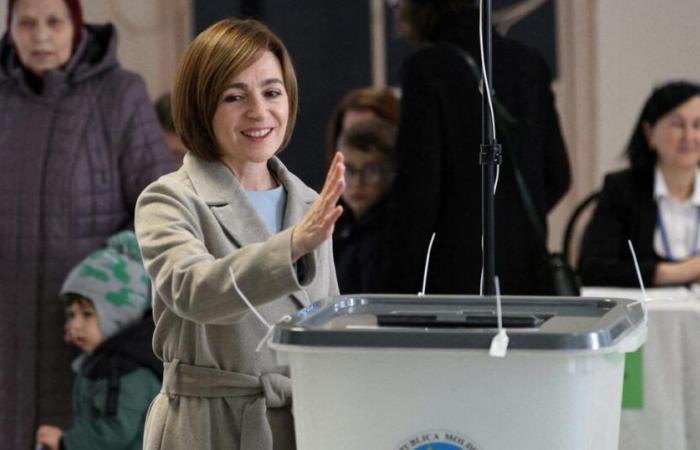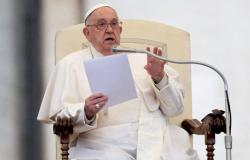INTERVIEW – Maia Sandu, outgoing candidate, won the second round of the presidential election on Sunday. A victory linked to his speech in favor of the European Union, which mobilized the diaspora, analyzes researcher Florent Parmentier.
Maia Sandu, outgoing candidate, won the second round of the Moldovan presidential election on Sunday with 55.33% of the vote despite strong Russian interference. Two weeks earlier, the Moldovans had approved by a narrow majority the inclusion of its European vocation in the Constitution. These two votes have a lot to do with the mobilization of the diaspora, the majority in favor of integration into the Western camp.
Florent Parmentier is a doctor in political science, secretary general of CEVIPOF (political research center of Sciences Po Paris) and associate researcher at the HEC Geopolitics Center. He is the author of Moldova at the crossroads of worlds (non-place editions, 2019).
LE FIGARO.- How to analyze the results of the second round of the presidential election in Moldova?
Florent PARMENTIER. – Maia Sandu won a clear victory. It is in the upper range of what was predicted by the polls, which struggle to estimate the mobilization of the Moldovan diaspora. This voted 80% for Maia Sandu. However, his opponent, the socialist Alexandr Stoianoglo (rather close to Russia, Editor's note), obtained the majority of votes on Moldovan territory with 51% of the votes. Maia Sandu's large victory is therefore a defeat on the field. It comes after a narrow success in the referendum validating membership of the European Union (50.4%) two weeks ago. Finally, participation is quite significantly higher than that of the second rounds in 2016 and 2020, for the previous presidential elections.
Maia Sandu received almost the same number of votes as four years ago. His opponent, on the other hand, mobilized widely in Moldova. The electoral map is, in this respect, striking. If 80% of the diaspora voted for the outgoing president, Gagauzia (an autonomous region populated by Turks where Russia's footprint is very strong, Editor's note) voted 97% for Alexandr Stoianoglo. In Taraclia, 94% of the votes also went to him even though this region is marked by a strong Bulgarian minority. Then, the North and the South of the country traditionally vote for so-called pro-Russian candidates and the Center and the West for so-called pro-European candidates. These dynamics, however, did not favor the opposition candidate who wanted to impose a sanction vote on Maia Sandu. The latter was able to gain votes between the two rounds.
How did Maia Sandu manage to create a voting dynamic in her favor?
His speech changed between the two rounds. It became more dramatic between the two rounds. From the evening of the first round, while the police cited 130,000 vote purchases before the election, Maia Sandu spoke of 300,000 vote purchases without providing any proof.
Then, certain electorates like those of Irina Vlah (5.4% in the first round), the former leader (Together, Editor’s note) from the autonomous region of Gagauzia; of Victoria Fortuna (4.5%), who is suspected of having benefited from the support of Ilan Shor (an oligarch who fled to Russia after being involved in the theft of the Moldovan central bank, Editor's note) ; finally, Vasile Tarlev (3.2%), former prime minister (2001-2008) of the Communist Party, turned to the opposition. Others, however, have turned to abstention. But the dramatization of the issues allowed a significant mobilization of the diaspora.
What was Moscow's strategy in this second round?
Two elements must be differentiated: what is influence and what is interference. All actors have influence. When Ursula Von Der Leyen comes ten days before the start of the vote to announce aid of 1.8 billion euros, it is a form of influence! In this, it defends the interests of the European Union, just as Russia supports certain candidates that it considers favorable to its interests.
Moscow has implemented disinformation techniques, but also vote buying with the help of Ilan Shor. He created a form of electoral tourism, and transported Moldovan voters who could not vote in Russia because there were only two polling stations. The power in place in Chisinau fell short of the recommendations of the central electoral commission which proposed five polling stations, but the authorities assured that they could not guarantee their security. Shor, with the support of Moscow, seized on this argument for organizing the transportation of voters to Baku, Minsk or Istanbul by plane or bus.
What does this result of the link between Moldova and Russia reflect?
First, the so-called pro-Russian camp has been transformed. Opposition candidate recognizes Russia's aggression in Ukraine. He wants to continue European integration, but does not want to adopt sanctions against Moscow. He does not wish to join the Eurasian union which brings together several countries of the former USSR. Finally, he wants to maintain military neutrality and work with Russia when it can be a development partner. We are far from the pro-Russian demands of the past. This reflects a more loosened link than in the past with Moscow, but also an evolution of this part of the Moldovan electorate.
Then, we observe a form of polarization of the vote in Moldova. The electorate in Transnistria (a region under Russian occupation since 1992, editor's note) is not the one who voted the most in favor of Alexandr Stoianoglo. It is that of Gagauzia which is fully within Moldova. This reflects a desire of the Moldovan electorate to pursue integration into the European Union without alienating Russia, contrary to what was perceived as Maia Sandu's policy: having an exclusive choice between the European Union and the Russia.
Is Maia Sandu's victory a defeat for Russia?
Yes, because Maia Sandu is the one who is doing the most to break all forms of ties with Russia. However, Moldova is a parliamentary republic. If the president has been elected by universal suffrage since 2016, the election which will bring about changes is the legislative election scheduled for July 2025. If Maia Sandu served as a driving force for her party for the presidential election, she will have difficulty obtaining a majority for his reforms in parliament. This result will show a global picture of what Moldovans want. This will be influenced by the result of the election in the United States and by the outcome of the Ukrainian war.






